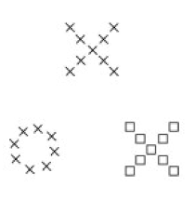Neuroscience
 To focus on details or the whole? This is one of the major ways that people differ in their style of mental processing. Past research has shown that people on the autism spectrum tend to focus more on details. Other studies reveal cross-cultural differences. People from collectivist cultures like Japan show a bias for focusing more on the bigger picture, known as "global processing", whilst citizens in individualist cultures like Britain show a comparatively greater bias for detail or "local processing". Now a study, led by Serge Caparos at Goldsmiths, of a remote African society, makes the case that this cultural difference is caused, not so much by degrees of collectivism or individualism, but rather by exposure to varying levels of urbanisation.
To focus on details or the whole? This is one of the major ways that people differ in their style of mental processing. Past research has shown that people on the autism spectrum tend to focus more on details. Other studies reveal cross-cultural differences. People from collectivist cultures like Japan show a bias for focusing more on the bigger picture, known as "global processing", whilst citizens in individualist cultures like Britain show a comparatively greater bias for detail or "local processing". Now a study, led by Serge Caparos at Goldsmiths, of a remote African society, makes the case that this cultural difference is caused, not so much by degrees of collectivism or individualism, but rather by exposure to varying levels of urbanisation.



Related studies covered on the Digest:
Post written by Christian Jarrett for the BPS Research Digest.
- Living In A City, Or Growing Up In One, Is Associated With Heightened Brain Sensitivity To Social Stress
Without fanfare or formal announcement, human civilisation has passed a momentous milestone. For the first time, more of us now live in cities than in rural communities. The benefits are numerous: more jobs, better access to educational and health services,...
- Extras
Eye-catching studies that didn't make the final cut (plus some other tit-bits): Did working memory spark creative culture? How thinking of sex vs. love changes our mode of mental processing. Thinking of love boosts our global processing, including...
- Teenage Boy Exhibits Inverted Face-inversion Effect ...
There's a war going on in the face processing literature, fought not with bullets but with case studies and journal publications. The bone of contention is whether there's something unique about our face processing ability, or if face processing...
- Head Size And Attention-to-detail Are Linked In Children With Autism
Like many people with autism, the celebrated artist Stephen Wiltshire has an incredible ability to focus on small details, as evidenced by his beautifully intricate art-work (see image). However, in the lab, psychologists have struggled to pin down this...
- Attentional Bias And "gaydar"
Global or Local? Gay or Eurotrash? Navon figure flanked by two game pieces from Gay or EUROtrash? the ultimate gaydar game! Believe it or not, there's an article in the new journal Frontiers in Cognition1 entitled "Sexual orientation biases attentional...
Neuroscience
Do urban environments trigger a mindset that's focused on the bigger picture?


Caparos and his team used two kinds of stimuli presented on-screen to measure processing bias. The first is known as the Ebbinghaus illusion, in which the perceived size of a central circle is affected by the relative size of the circles surrounding it. A circle surrounded by bigger circles will generally be perceived as smaller, especially by people with a bias towards more global processing.
The second stimuli involved large letters comprised of little letters or shapes. Participants had to make a similarity judgement - for example, they were presented with a large X made up of little x's and had to say whether it was more similar to a large circle made up of little x's or a large X made up of little squares. People with a bias towards global processing would be expected to say the two large X's are more similar.

To gauge the effect of urbanisation, the researchers tested dozens of people from the remote Himba society of Namibia, as well as dozens of undergrads from Japan and Britain. Crucially, some of the Himba lived traditionally in village huts and homesteads whereas others had moved to, and lived for several years in, Opuwo, the Himba's only permanent, urban settlement. Also, some of the traditional Himba had visited Opuwo, either once, twice or three times.
The Japanese were more sensitive to the Ebbinghaus illusion than the Brits (indicative of a greater global processing bias, consistent with past research); the Brits, in turn, were more sensitive to it than the traditional Himba. Critically, though, the urban Himba were just as sensitive to the illusion as the British. Visits to the town Opuwo made no difference to the performance of the traditional Himba on this task.
On the similarity judgement task, the Japanese and Brits showed the most global choices, more than both groups of Himba. However, the urban Himba made more global choices than the traditional Himba and, moreover, global choices were made more often by traditional Himba who'd visited the town than those who hadn't. Indeed, just two visits to Opuwo increased global choices by ten per cent.
Age and levels of schooling made no difference to any of these results and past research has confirmed that the Himba are unfazed by testing with a computer monitor.
The more established theory for cross-cultural differences in local/global processing bias would predict that the Himba should show even more of a global processing bias than the Japanese, given the highly collectivist nature of their society. Also, this social orientation account would predict that experience of more individualistic urban living should lead to more local processing bias, not the greater global processing that was observed.
"Our proposal," the researchers said, "is that exposure to the urban environment investigated here introduced visual clutter with consequent changes in global/local processing." Their claim tallies with past research showing the opposite effect - that exposing townies to natural environments increases their bias for details.
"Further research will need to determine the processes by which cluttered visual input and/or other aspects of the urban environment come to change perceptual foci of interest in the dramatic way observed here," the researchers concluded.
_________________________________

Caparos, S., Ahmed, L., Bremner, A., de Fockert, J., Linnell, K., & Davidoff, J. (2012). Exposure to an urban environment alters the local bias of a remote culture Cognition, 122 (1), 80-85 DOI: 10.1016/j.cognition.2011.08.013
Related studies covered on the Digest:
- Living in a city, or growing up in one, is associated with heightened brain sensitivity to social stress.
- Asian Americans and European Americans differ in how they see themselves in the world.
- We underestimate the benefits of nature.
Post written by Christian Jarrett for the BPS Research Digest.
- Living In A City, Or Growing Up In One, Is Associated With Heightened Brain Sensitivity To Social Stress
Without fanfare or formal announcement, human civilisation has passed a momentous milestone. For the first time, more of us now live in cities than in rural communities. The benefits are numerous: more jobs, better access to educational and health services,...
- Extras
Eye-catching studies that didn't make the final cut (plus some other tit-bits): Did working memory spark creative culture? How thinking of sex vs. love changes our mode of mental processing. Thinking of love boosts our global processing, including...
- Teenage Boy Exhibits Inverted Face-inversion Effect ...
There's a war going on in the face processing literature, fought not with bullets but with case studies and journal publications. The bone of contention is whether there's something unique about our face processing ability, or if face processing...
- Head Size And Attention-to-detail Are Linked In Children With Autism
Like many people with autism, the celebrated artist Stephen Wiltshire has an incredible ability to focus on small details, as evidenced by his beautifully intricate art-work (see image). However, in the lab, psychologists have struggled to pin down this...
- Attentional Bias And "gaydar"
Global or Local? Gay or Eurotrash? Navon figure flanked by two game pieces from Gay or EUROtrash? the ultimate gaydar game! Believe it or not, there's an article in the new journal Frontiers in Cognition1 entitled "Sexual orientation biases attentional...
